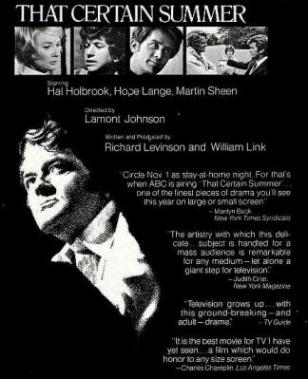
THAT CERTAIN SUMMER
US, 1972, 74 Minutes, Colour.
Hal Holbrook, Hope Lange, Scott Jacoby, Martin Sheen,
Joe Don Baker.
Directed by Lamont Johnson
That Certain Summer is one of the earliest telemovies, winning Golden Globes in 1973 and getting many other nominations. It was one of the earliest films to deal with the theme of homosexuality.
Hal Holbrook portrays a man who is separated from his wife (Hope Lange) and is living with his partner, played by Martin Sheen. His son, Scott Jacoby in an award-winning role, cannot deal with this situation. However, he finds guides who are able to help him understand and accept the situation.
The film was written by the prolific team of William Levinson and Richard Link (whose life and collaboration was dramatised in the telemovie The Boys with James Wood and John Lithgow). They also wrote the very interesting telemovie The Storyteller which showed how a television writer had to deal with moral issues.
The film was directed by Lamont Johnson who made quite a number of small films for the big screen as well as many telemovies. Some of his interesting films at this period include A Gunfight, The Groundstar Conspiracy, The Mc Kenzie Break, The Last American Hero. He also made the telemovie, The Execution of Private Slovik with Martin Sheen.
1. Was it evident that this was a television movie? Would it have been made differently if it had been made for cinemas? Especially in terms of style, treatment of subject?
2. How well did it handle its controversial subject? Was it adapted for home viewing? Was it contrived? Was it realistic?
3. How successful was the film showing the problem through Nick's eyes? Nick as an average boy? His relationship with his mother, the effect of the divorce on him, his wanting to have a holiday with his father, his good relationship with his father and enjoying the outings in San Francisco, his suspicions of Gary, his unspoken jealousy, his moodiness, the encounter with Gary at work and the talk, his reaction to the party, the hints at the reality, his running away from home after looking at the watch, his riding up and down on the tram, his encounter with the black conductor and their talk. How do you think he would be able to cope with the problem? Was the film fair in showing things through his eyes?
4. How sympathetic a character was Doug Salter? The fact that it was not revealed what he was until half way through the film? How did he present himself at work, in his relationship with his clients, his sensitivity, his love for his son, the enjoyment of the outings? His relationship with Gary and how this was presented and hinted at in the film? His past and the lack of success of his marriage? His not telling his son the truth? His reaction to this and the anxiety of his search?
5. How sympathetic a character was Gary? How well was he presented? What was his relationship to Doug? Why did he want to be liked? The incident with the cake and the guitar playing? His success at work? His not hitting it off with Nick? His contribution to the search? His encounter with Janet and their working out of the relationship? The importance of the sequence between himself Phil and Jody?
6. Phil's awkwardness at the homosexuality as being typical of the ordinary man? How central was this sequence of the three of them for the whole film and audience involvement in the theme? Did Phil represent the average viewers reaction? What effect did this have for the rest of the film?
7. How sympathetic a person was Janet? As a mother? As a wife - her explanation that she had hoped to Doug? Her anxiety about Nick? How necessary was it to have told Doug the truth? Had this been possible prior to the events of the film? Was Doug right to be wary about the effect on him?
8. What insight did the film give into homosexuality? Did it show it as a social issue? As a personal and social issue? How did it avoid legal questions by focusing on the emotional situations? Was it an accurate and just portrayal of such a situation?